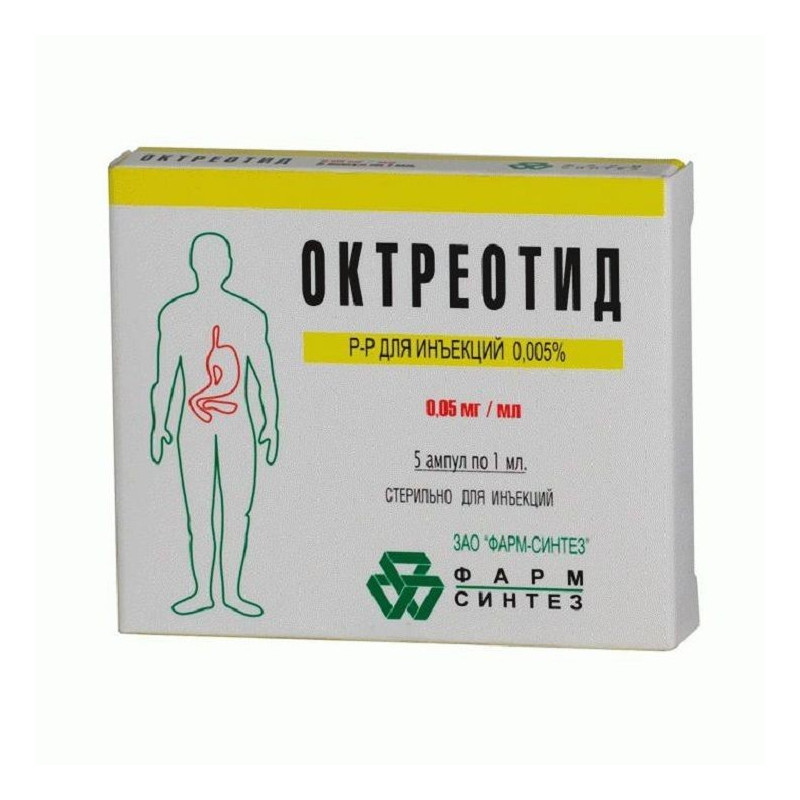



 All payments are encrypted via SSL
All payments are encrypted via SSL
 Full Refund if you haven't received your order
Full Refund if you haven't received your order
Injection
1 ml solution for injection contains: Octreotide (in the form of a free peptide) 50 mcg.
Excipients: sodium chloride, water d / and.
5 vials of 1 ml.
Octreotide is a hormonal drug, an analogue of somatostatin. It is a synthetic octopeptide, which is a derivative of the natural hormone somatostatin and has similar pharmacological effects, but a much longer duration of action. The drug inhibits pathologically increased secretion of growth hormone, as well as peptides and serotonin produced in the gastro-entero-pancreatic endocrine system. The use of Octreotide during and after surgery on the pancreas reduces the incidence of typical postoperative complications (for example, pancreatic fistulas, abscesses, sepsis, acute postoperative pancreatitis).
- Prevention and treatment of complications after operations on the abdominal organs.
- Stopping bleeding and preventing rebleeding from esophageal varicose veins in patients with cirrhosis.
- Treatment of acute pancreatitis.
- Ulcerative bleeding.
- Hypersensitivity to the drug.
Caution should be used in the following cases:
- Cholelithiasis.
- Diabetes.
- When pregnancy.
- During lactation.
Adequate and strictly controlled clinical studies of the safety of the use of Octreotide has not been conducted. Use during pregnancy and lactation is possible only by absolute indications, when the expected benefit of therapy for the mother outweighs the potential risk to the fetus. Category of action on a fruit B.
In the treatment of acute pancreatitis the drug is injected s / c at a dose of 100 mcg 3 times / day for 5 days. You can assign up to 1200 mg / day IV.
For the prevention of complications after pancreatic surgery the first dose of 100 μg is injected s / c for 1 hour before laparotomy; then after the operation, a sc / 100 mcg dose is administered 3 times / day for 7 consecutive days.
To stop bleeding from esophageal varices administered intravenously in a dose of 2.5-50 μg / s in the form of continuous infusions for 5 days. Elderly patients do not need to reduce the dose of Octreotide.
To stop ulcerative bleeding administered at a dose of 25 μg / h as an intravenous infusion for 5 days.
Gastrointestinal: possible anorexia, nausea, vomiting, spastic abdominal pain, feeling of bloating, excessive flatulence, loose stools, diarrhea, steatorrhea.Although the excretion of fat with feces may increase, there is no indication that long-term treatment with octreotide may lead to the development of malabsorption disorders (malabsorption). Seldom - the phenomena reminding acute intestinal impassability. In some cases, acute pancreatitis without cholestasis, hyperbilirubinemia in combination with an increase in the activity of alkaline phosphatase, GGT and to a lesser extent other transaminases. With prolonged use, the formation of stones in the gallbladder. There are reports of rare cases of acute pancreatitis, which developed in the first hours or days of use and disappeared after the withdrawal of octreotide.
Cardiovascular: in some cases - arrhythmia, bradycardia.
From the carbohydrate metabolism: possibly impaired glucose tolerance after a meal (due to the suppression of insulin secretion by the drug), hypoglycemia; rarely with prolonged treatment, persistent hyperglycemia.
Local reactions: possible pain, itching or burning, redness, swelling (usually disappear within 15 minutes).
Other: allergic reactions, alopecia.
In patients with diabetes receiving insulin, octreotide may reduce the need for insulin. If gallbladder stones are detected before treatment, the question of using octreotide is solved individually, depending on the ratio of the potential benefits of therapy and the possible risk associated with the presence of stones in the gallbladder.Side effects on the part of the digestive system can be reduced if octreotide injections are made between meals or before bedtime. To reduce the phenomena of discomfort at the injection site, it is recommended to bring the solution of the drug before the introduction to room temperature and introduce a smaller volume of the drug. Multiple injections should be avoided at the same place at short intervals.
Octreotide reduces the absorption of cimetidine, cyclosporine, diuretics, beta-blockers, Calcium antagonists, insulin, oral hypoglycemic drugs. With simultaneous use of octreotide and Bromocriptine, the bioavailability of the latter increases. Drugs that are metabolized with the participation of cytochrome P450 isoenzymes and having a narrow therapeutic dose range should be administered with caution.
Symptoms: short-term decrease in heart rate, feeling of flushing, abdominal cramping, diarrhea, nausea, empty feeling in the stomach.
Treatment: conducting symptomatic therapy.
The drug should be stored in a dark place at a temperature of 8 ° to 20 ° C.
